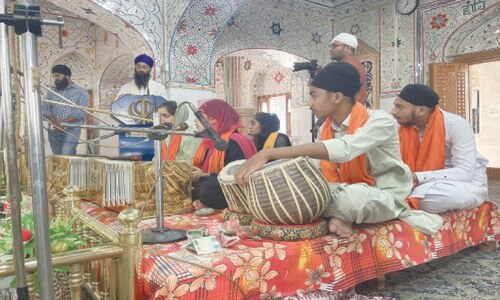ISLAMABAD: The unfolding developments in the Middle East are reshaping the regional dynamics, giving rise to new geopolitical realities with significant implications for regional stability and power structures, which could fundamentally alter the balance of power and influence across the region, speakers at a roundtable discussion said on Friday.
The discussion titled: ‘Israel’s Gaza Genocide: Specter of a Widening War’ was hosted by Islamabad Policy Institute to dissect the escalating conflicts in the region, particularly focusing on Israel’s slaughter in Gaza and Israel – Iran military exchanges, according to a press release issued by the think-tank.
The participants were of the view that the redefining of regional power dynamics has prompted a critical reevaluation of strategies by key stakeholders.
Dr Shireen Mazari, while opening the debate as the chair of the session, said that “US had been setting the stage for the widening conflict for a while in terms of providing the strategic environment on the ground by not fulfilling the responsibility to protect, and allowing blatant violations of genocide convention, humanitarian law, Vienna Convention on Diplomatic Relations, and gathering of military alliances on the ground.”
She regretted the silence of Muslim countries, especially the Arab world on the massacre in Gaza and warned that if these countries that are at the “crux of the evolving new world” do not act proactively by accepting the new reality, they would suffer for not keeping up with the changing times.
Senator Mushahid Hussain Sayed said the events that started with ‘Toofan Al-Aqsa’ on Oct 7 have jolted the Western led security architecture in the region and three new realities have emerged in the shape of shattering of the status quo in the Middle East that had been built by Israel and US; resurgence of terrorism both by state and non-state actors; and intensification of the new cold war unleashed by US against China, Russia and Iran.
He said that in the new situation Israel has on the one hand lost the war in Gaza politically, legally and morally as its genocide has rallied the Global South in support of Palestine; it has on the other buried Modi-Biden’s India-Middle East-Europe Economic Corridor under “the rubble of Gaza”.
Mr Syed said that though chances of aggravation of conventional direct conflict between Iran and Israel were dim, there was a greater worry that ‘shadow war’ between the two would intensify. He believed one of the ways Israel would try to destabilise Iran would be to exploit its ethnic minorities, which could in turn affect Iran-Pakistan ties as well.
Senator Farhatullah Babar, while talking about the start of a direct conflict between Israel and Iran, said that Iran’s reply has broken the myth of invincibility of Israel by sending a strong message that no matter how sophisticated are the air defenses of the Zionist state, targets can still be hit.
He argued that though Iran’s retaliation against the missile strike on its Damascus Consulate and Israel’s counter attack in Isfahan early Friday morning have been symbolic with both sides showing restraint in executing them, Tehran has successfully demonstrated its capability to respond to provocations.
Senator Afrasiab Khattak expressed his fear that the rise of extremism because of the aggravating conflict in the Middle East would affect Pakistan and its neighbourhood the most. He proposed that Pakistan should, therefore, continue with China Pakistan Economic Corridor, strengthen ties with Iran and change its Afghanistan policy for safeguarding its interests in the evolving situation.
Mr Khattak said Iran has won this round of the conflict by delaying recognition of Israel by Arab states and highlighting the Palestinian crisis.
Published in Dawn, April 20th, 2024















































Dear visitor, the comments section is undergoing an overhaul and will return soon.